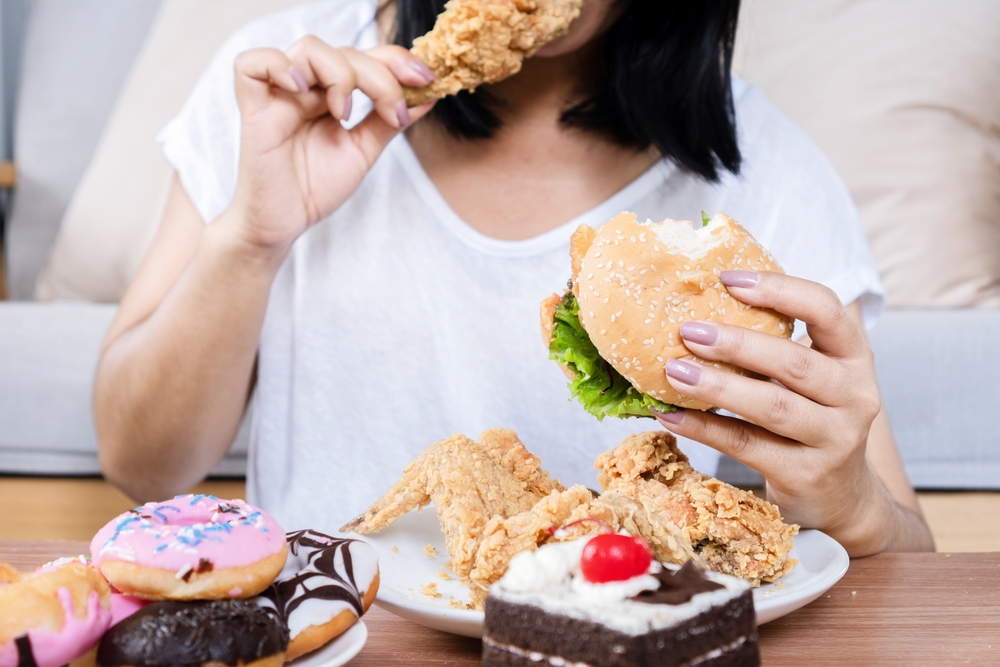Last Updated:
July 21st, 2025
Food Addiction | Symptoms, Effects and Causes
Do you constantly find yourself powerless against the urge to eat? Then you’re not alone. Food addiction is one of the most significant and widespread eating disorders, affecting more people than Anorexia and Bulimia Nervosa combined. This amounts to around 2% of all people, yet only a quarter of these ever seek professional help for food addiction. The consequences of food addiction going untreated can be severe, with risks to health, happiness and future well-being. However, being able to spot the signs and symptoms of food addiction and knowing where to get help can reduce these risks and enable you to build a healthier relationship with food.

What is food addiction?
This condition is a behavioural addiction that involves an uncontrollable urge to consume food, especially junk food and sweets. Those suffering from food addiction often find themselves eating large amounts in one sitting, even if they are not hungry, driven by intense cravings that fuel their eating habits.
Food addiction should not be mistaken for occasional overeating or a liking for unhealthy food. It is a recognised medical condition that adversely affects every aspect of health and requires dedicated professional treatment to address and overcome the underlying issues.
In the UK and worldwide, the issue of food addiction is becoming more apparent, along with high rates of other eating disorders. Research spanning several countries indicates that about 14% of adults and 12% of children have an addiction to ultra-processed foods. Food addiction often remains hidden and underdiagnosed but many people suffering from chronic obesity and weight-related complications may, in fact, be struggling with food addiction.
What are the signs of food addiction?
It is important to detect the signs of food addiction early to allow for intervention. This can be difficult because of the differences in individual eating behaviours and how common overeating has become. If you’re concerned about potential food addiction in yourself or others, here are some important food addiction symptoms to spot:
- You experience intense cravings for specific foods, regardless of your actual hunger.
- Once you start eating, it becomes difficult to stop and you end up breaking promises you made to yourself about portion control.
- You find yourself hiding or secretly eating food because you are ashamed of your actions.
- You continue to eat past the point of fullness because you can’t stop yourself.
- Eating results in feelings of guilt, particularly after you have eaten large quantities.
- Food is becoming a refuge for managing emotions such as boredom, sadness or stress.
- You prefer to eat alone, avoiding social activities and loved ones.
- Your performance at home, school or work is suffering due to preoccupation with eating.
- You are experiencing physical discomforts like headaches, fatigue or digestive issues from habitual overeating.
These food addiction symptoms should be taken seriously and prompt you to seek professional help for food addiction.
What are the causes of food addiction?
Food addiction stems from a mix of physical, psychological and biological influences in a similar way to eating disorders. Physically speaking, when you eat foods loaded with sugar, salt, and fats, your brain releases dopamine, a key neurotransmitter that is involved in reward and pleasure centres. This release is comparable to the sensations derived from drug consumption or sexual experiences. Many who suffer from food addiction are thought to have a modified brain reward system that heightens pleasure from eating and this can cause them to chase these highs, locking them into a cycle relentlessly.
Psychologically, food addiction pathways vary widely among individuals. Many develop compulsive eating behaviours in childhood, using food as a comfort tool to manage their emotions. Others might start emotional eating during their later years as a means to handle stress, past traumas or existing mental health issues. Unfortunately, this only offers short-lived solace and can exacerbate the root problems over time.
Whatever a person’s causes, one of the complexities in overcoming food addiction is that everyone must eat so total abstinence, like with drugs or alcohol, is impossible. This means recovery efforts must centre on establishing a balanced relationship with food and curtailing patterns of binge eating and compulsion.
The mental and physical dangers of food addiction
Food addiction can cause enormous health issues and the resulting overeating can even lead to fatal conditions.
Some of the most serious physical dangers include:
- Obesity
- Dangerously high cholesterol and blood pressure
- Type 2 diabetes
- An increased risk of stroke, heart disease and heart attacks
- Serious digestive issues
- Deficiencies of key nutrients
Mental health dangers of food addiction can include:
- Low self-esteem
- Anxiety
- Depression
- Self-harming thoughts
- Suicidal thoughts
- Guilt or shame after eating
These issues are all life-affecting and some even life-threatening so professional help for food addiction is crucial.
What does recovery from food addiction involve?
Recovery from food addiction requires an intensive treatment approach, ideally provided in an inpatient rehab facility. This ensures constant support and specialised care from a team of professionals skilled in both addiction treatment and nutritional guidance.
Effective food addiction rehab programmes integrate various therapies to help patients understand and change their addictive eating behaviours. These therapies can be offered through both group and individual sessions to allow for shared wisdom and personal growth.
Nutrition is also a very important part of recovery from food addiction. The best rehab programmes involve a dietary assessment from an expert dietitian, which informs the creation of a personalised nutrition plan. This plan will be designed to meet specific dietary needs and teach the patient the principles of healthy eating.

What therapies help treat food addiction?
Treating food addiction involves therapies that address both the psychological and behavioural aspects of the disorder. These are similar to eating disorder treatment approaches and often include:
Where can I get help for food addiction?
Choosing recovery from food addiction is the first crucial step toward reclaiming your life. If you’re not sure how to get started, Addiction Helper is here to help. Reach out to us today and let our experienced team guide you to the recovery path that suits you best.
Our compassionate team are ready and available to take your call, and guide you towards lasting the lasting addiction recovery you deserve.
Frequently Asked Questions
(Click here to see works cited)
- Gearhardt, Ashley N et al. “Social, clinical, and policy implications of ultra-processed food addiction.” BMJ (Clinical research ed.) vol. 383 e075354. 9 Oct. 2023, doi:10.1136/bmj-2023-075354
- Goodman, Brenda. “Food Addiction Signs and Treatments.” WebMD, 15 March 2023, https://www.webmd.com/mental-health/eating-disorders/binge-eating-disorder/mental-health-food-addiction. Accessed 13 March 2025.
- Gunnars, Kris, and Timothy J. Legg. “8 Common Symptoms of Food Addiction.” Healthline, 11 November 2019, https://www.healthline.com/nutrition/8-symptoms-of-food-addiction. Accessed 13 March 2025.
- Parylak, Sarah L., et al. “The Dark Side of Food Addiction.” Physiology & Behavior, vol. 104, no. 1, 2011, p. 149, https://doi.org/10.1016/j.physbeh.2011.04.063. Accessed 13 March 2025.
- UK Addiction Treatment Centres. “Food Addiction Rehab: Overcoming Food Dependency | UKAT.” UK Addiction Treatment Centres, 8 January 2024, https://www.ukat.co.uk/addiction/behavioural/food/. Accessed 13 March 2025.

